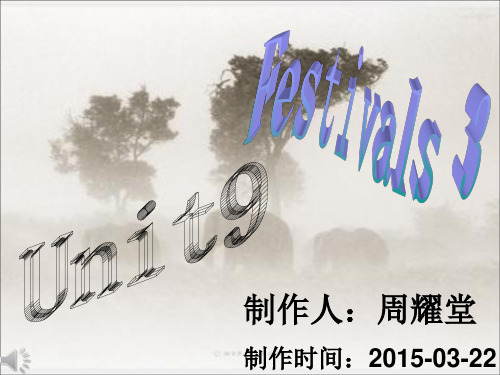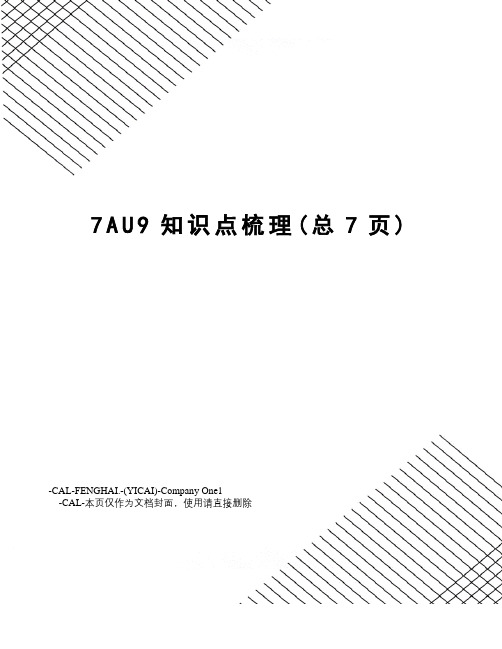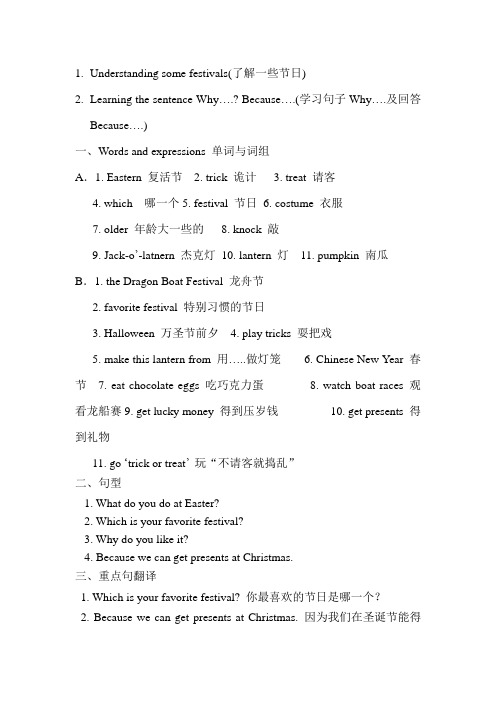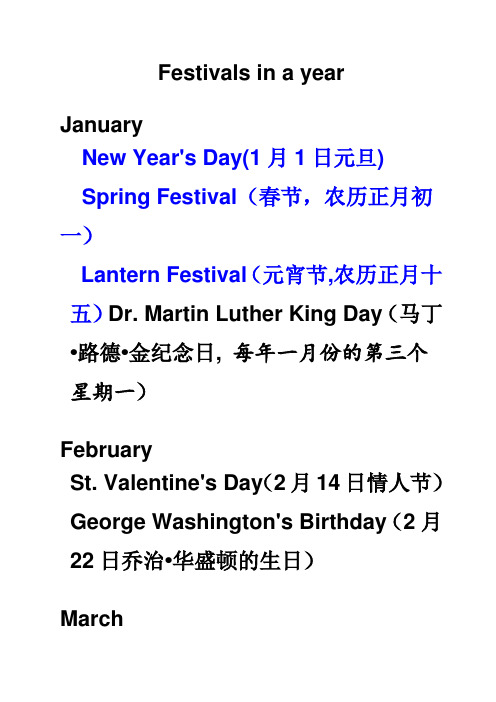unit9festivals分享资料
泛读教程I Unit 9 festivals and holidays

Understanding Sentences
While the Polish delegation boasted among its members Irena Szewinska, the track-and filed great who has won seven medals over Olympics, the Nanjing team featured Yang Yang, the former world champion short-tract speed skater who won a total of five medals at the 1998 and 2002 Winter Games.
-en (adj.) 物质名词+en
• golden • wooden • earthen • wheaten • leaden • silken • woolen
-en (v.)
• threaten • strengthen • weaken • frighten • tighten • soften • harden • quicken
Understanding Sentences
•His parents bought him a new set of wheels.
•The problem is that we need more hands now.
•Have you ever read Shakespeare?
Understanding Sentencected. •The policeman was watching a pick-pocket.
Understanding Sentences
Since shyness goes hand in hand with a lack of self-esteem, it is important for people to accept their weakness as well as their strengths.
四年级下册英语教案-Unit 9 Festivals 深港朗文版

Unit 9 Festivals教案教学目标语言技能目标◆会读各个节日并会描述每个节日的活动。
◆能够询问别人最喜欢的节日是什么并会回答。
◆了解中外节日文化及其区别。
学习策略目标◆通过跟读、对话和角色扮演等,掌握本课词汇和句型。
情感态度目标◆通过小组活动,做调查活动,培养学生乐于助人、团结、友善的精神。
◆通过对传统节日的认识,培养学生民族意识。
使学生进一步了解中外节日文化及其区别,激发学生爱国热情。
◆通过一系列的教学活动,激发学习英语的兴趣,增加了学生用英语表达的自信。
文化意识目标◆通过本单元的学习,加深了学生对中外传统节日的了解,了解中外节日的习俗以及差异。
教学重难点1.能听懂、会说When’s(节日名字)? It’s in(season)… What do you do at(festival)? We…(activity)? Which is your favourite festival? I like(festival). Why do you like it? Because we …(activity)2. watch boat races, Halloween/ go ‘trick or treat’, Christmas/get presents, Chinese New Year/get lucky money.教学过程Step 11.根据月份划分四个季节并复习每个季节的所在月份及其天气。
2.复习Children’s Day, Teachers’ Day, National Day and Chinese New Year。
然后谈论中国的新年:春节是中国传统节日之一,请问:春节在哪个月份?在哪个季节呢?引导学生说:春节在冬天。
然后老师接着问:春节做些什么呢?鼓励学生回答:在春节,我们拿利是钱。
就这样,句型“What do you do at Chinese New Year? We get lucky money at Chinese New Year.”就呈现出来了,并板书在黑板上。
人教版英语九年级unit9知识点

人教版英语九年级unit9知识点Unit 9: Celebrating Culture - Exploring Diverse TraditionsIntroduction:In this article, we will delve into the knowledge points of Unit 9 of the 9th grade English textbook prescribed by the Ministry of Education in China. Unit 9 focuses on celebrating culture and explores diverse traditions that exist around the world. It is crucial to understand and appreciate different cultures as it promotes empathy, tolerance, and acceptance of diversity.1. Traditional Festivals:Traditional festivals are an important part of cultural heritage, allowing individuals and communities to connect with their roots and understand their history. The unit introduces us to various traditional festivals celebrated worldwide, such as Diwali, Thanksgiving, Christmas, etc. Exploring these festivals helps us gain insights into the unique customs, rituals, and significance behind them.2. Festive Foods:Food plays a significant role in traditional festivals. It not only nourishes the body but also symbolizes cultural values and traditions.The unit highlights some traditional festive foods, like mooncakes, turkey, and kolach, revealing the cultural significance attached to these delicacies. Understanding the historical and cultural context behind festive foods expands our knowledge of different cultures.3. Customs and Symbols:Every culture has its own customs and symbols that hold special meaning. Unit 9 provides examples of customs and symbols associated with different festivals or celebrations. For instance, the unit mentions the practice of decorating Christmas trees, the use of lanterns during Chinese New Year, and the significance of rangolis during Diwali. Exploring these customs and symbols nurtures an appreciation for cultural diversity and fosters intercultural understanding.4. Traditional Costumes:Traditional costumes are an essential aspect of a culture's identity. Unit 9 introduces us to various traditional costumes worn during festivals or special occasions. Each costume reflects not only the fashion trends of that era but also conveys cultural values, history, and aesthetics. For example, the hanbok in South Korea and the kimono in Japan symbolize their respective cultures, while the qipao represents Chinese culture. Learning about traditional costumes enhances our understanding and respect for cultural differences.5. Festive Music and Dance:Music and dance are universal languages that transcend cultural boundaries. Unit 9 provides insights into the music and dance forms associated with various celebrations. For instance, the unit explores Indian classical dance forms like Bharatanatyam and Kathak, as well as Western dances like the waltz and salsa. Discovering the rhythms and melodies of different cultures broadens our horizons and helps us appreciate the rich artistic heritage worldwide.6. Art and Crafts:Art and craft forms have been passed down through generations, preserving cultural traditions. The unit discusses the art and craft forms associated with festivals, such as Chinese paper cutting, Mexicanpiñatas, and Indian Rangoli. Exploring these artistic expressions fosters creativity and an understanding of the beauty and diversity in global art practices.Conclusion:Unit 9 of the 9th grade English textbook takes us on a journey through diverse cultural traditions. By studying traditional festivals, festive foods, customs, symbols, costumes, music, dance, art, and crafts, we gain a deep appreciation for the rich tapestry of global cultures.Understanding and celebrating cultural diversity is crucial in building a harmonious and inclusive society. Let us embrace our differences and promote intercultural understanding for a better future.。
英语Festivals课件

Western Festivals
Halloween ['hæləu'i:n] Christmas Day Valentine's Day ['væləntains dei]
Task2:Talk about Halloween 万圣节简介
在每年的11月01日是西方传统的“鬼节”——万圣节。 10月31日是万圣节前夕(Halloween). 不过这一天的气 氛却远不像它的名称那样让人听上去就“毛骨悚然”。每 当万圣节到来,孩子们都会迫不及待地穿上五颜六色的化 妆服,戴上千奇百怪的面具,提着一盏“杰克灯”(南瓜 灯)走家窜户,向大人们索要节日的礼物。万圣节最广为 人知的象征也正是这两样——奇异的“杰克灯”和 “Treat or trick”的恶作剧。 “杰克灯”的样子十分可爱,做法也极为简单。将 南瓜掏空,然后在外面刻上笑眯眯的眼睛和大嘴巴,再在 瓜中插上一支蜡烛,把它点燃,人们在很远的地方便能看 到这张憨态可掬的笑脸。这可是孩子们最喜欢的玩物了。 然而万圣节的重头戏还是在餐桌上,你既要准备好美 食来招待那些前来捣乱的“小鬼”,更要在这个特别的节 日为你的餐桌装扮一番。千万不要让你的客人们小瞧了你 哦!
fireplace
People decorate trees with lights ,small presents ,and balls.
What do people eat on Christmas Day?
[tə:ki]
People get together with their relatives(亲戚) and friends and have a big dinner.
Unit9 Festivals 2

选择最佳答案
1.Our classmates try to__once a year. A.gather with B.gather together C. Together D.with 2.Would you like to play baskedball with me? —Yes,_____. A.I’d like B.I like C.I’d love D.I’d love to 3.There are many flowers on__side of the street in the park. A.Both B.all C.eith D.three
•
通过自主学习,掌握下列知识 词组翻译: • 英汉互译:
• 7.share...with...____ • 8.在午夜_____ _______ 2.美味的__________ • 9.使爆炸、出发、动 身__ 3.幸福快乐________ • 10.hold a family 4.member_______ celebration____ 5.wondful_______ • 11.欢迎新年的到来 ____
• 4.Red lanterns __to celebrate the National Day. A.re hanging up B.are hung up C.hung up D.are hanged up 5.__the journey.In haven’t decided yet. A.as with B.as in C.as to D.as of 6.English is my __favorite subject. A.most B.the most C.best D./
制作人:周耀堂
制作时间:2015-03-22
Unit 9Festivals and Customs 节日与习俗

a. to show or describe someone or something b. cheating people
c. to give people an idea that someone or something has particular qualities
d. to discuss or think about something carefully e. to behave in a friendly way towards someone f. belonging or relating to a particular society and its way of life
Festivals and Customs
UNIT 9
You will be able to:
1. make complaints. 2. talk about festivals and customs. 3. write a letter of apology.
Look at the picture and discuss:
2. What does the dragon represent in European literature?
In European literature dragons are always represented as monsters against which the hero must do battle.
2
3 4 5 6
Warming up
1 Can you recognise the following words?
celebrate relative bell ring hang stocking present
深港版小学四年级下册Unit 9 festivals

Unit 9 festivals一. 重点词汇。
Easter复活节the Dragon Boat Festival端午节treat请客trick把戏Halloween万圣节前夕costume衣服、服装lantern灯笼、提灯pumpkin南瓜eat chocolate eggs吃巧克力蛋Jack-o’-lantern杰克灯watch boat races看龙舟比赛make Christmas cards做圣诞卡片eat rice dumplings吃粽子二.重点句型。
1. When do you do at Easter?2. Which is your favourite festival, Pat?3. Why do you like it? Because we can get presents at Christmas.4. My favourite festival is the Dragon Boat Festival.5. Halloween is on October 31 every year.三.重点语法。
1. What do you do at +具体节日?用来问候他人在某个节日里做什么?eg. What do you do at Easter?复活节你做什么?2. 以why开头的疑问句用because来回答。
eg. Why do you like it ? 为什么你喜欢它?Because we csn watch boat races at the Dragon Boat festival.因为在端午节我们看以看赛龙舟。
习题训练一一.选择填空( )1. _______ is Easter? It’s spring.A. WhatB. WhenC. Where( )2. _______ do you do at Easter? We eat chocolate eggs.A. WhatB. WhenC. Where( )3. What does Steven usually do in the morning?He usually _______ his face and hands.A. washesB. washedC. wash( )4. Hi! What are you doing? We _______ about a football match.A. talkedB. talksC. talking( )5. What’s the _______ like today? Cloudy.A. skyB. airC. weather二.你能选出正确的选项将句子补充完整吗?( )1.---I like Chinese New Y ear. How about you?---______________A. Me, too.B. I like summer.C. My mother does.( ) 2.---Is Halloween your favourite festival?---______________A. No, I like Halloween.B. Y es, I like Easter.C. Y es, it is.( )3. What do you do _______ your favourite festival?A. inB. onC. at( )4. Children are _______ “trick or treat”.A. gettingB. goingC. go三.小小翻译家1.我最喜欢的节日_____________________ 4. eat rice dumplings _____________________2.看龙舟比赛_________________________ 5. visit family and friends __________________3. 在十二月__________________________ 6. make Christmas cards ____________________习题训练二一.连词成句1. the, talking, favourite, children, festival, about, their, are________________________________________________________________________2. Christmas, get, because, can, we, presents, at________________________________________________________________________3. October, go, treat, trick, we, or, in________________________________________________________________________4. do, which, best, they, festivals, like?________________________________________________________________________ 二.选择填空( )1. Someone is knocking _______the door.A. toB. atC. in( )2. Easter is _______ spring.A. onB. atC. in( )3. Halloween is _______ October 31.A. onB. onC. in( )4. Christmas is _______ December.A. atB. onC. in( )5. Come _______! Let’s dress _______ and decorate our house.A. in; downB. on; upC. on; from三.请用给出单词的正确形式填空。
Unit 9 Festivals

prepared for
Please translate the sentences into English in your exercise books.
• • • • • • • • 1你愿意和我一起去吗? 2 我和我的朋友通常周末期间聚会。 3 上周我回家庆祝我爷爷的生日。 4 我们已经为期末考试做好了准备。 5 我们正在清扫院子。 6 服务员,请把我的外套挂起来好吗? 7 在路的两边有一些树 8 他设法使他的课生动有趣。
C
Choose the best answer
5 He tries to —— his lessons lively and interesting . A let B make C makes D lets
B
Complete the following sentences with the correct forms of the expressions . would like to , sweep out , hang up ,on both sides of .
Thank you for listening !
Good bye
●
4 They clean their houses mainly because the houses are very dirty. F
eful Expressions
• 1 愿意做……
Would like to do sth.
eful Expressions
• 2 聚集
gather together
• 1) When is the Spring Festival? It’s on the first day of a year on the lunar calendar.
AU9知识点梳理

7A U9知识点梳理(总7页) -CAL-FENGHAI.-(YICAI)-Company One1-CAL-本页仅作为文档封面,使用请直接删除七年级第一学期牛津英语知识点梳理Unit 9 International Food Festival知识点梳理:I 词组:1.different foods不同的食物2.need sth to do sth需要某物做某事3.take care of照顾4.homeless animals无家可归的动物5.raise some money for ….为……筹钱6.have an international food festival举行一个国际食品节7.sell food from different countries销售来自不同国家的食物8.in the playground在操场上9.make different foods制作不同的食物10.ask sb to do sth请求某人做某事11.on Saturday 在星期六12.at ten o’clock在十点整13.in the morning在早上14.like sth / sb best最喜欢(某物/某人)15.Chinese rice puddings八宝饭16.moon cakes月饼17.rice dumplings粽子18.hot dogs热狗19.apple pies苹果派20.raisin scones葡萄干烤饼21.fish and chips鱼与薯条22.pineapple fried rice菠萝炒饭23.prawn cakes虾饼24.Chinese/American/English/ Thai food中国的/美国的/英国的/泰国的食品25.show sb how to make sth教某人如何制作某物26.of course当然27.would like to do sth / want to do sth想要做某事28.200 grams of self-raising flour200克自发面粉29.mix A, B and C together把A,B和C混合在一起30.pour into sth倒入某物31.make sth into sth把某物制作成某物32.a little 一点(+不可数名词)33.150 milliliters of milk150毫升牛奶34.make shapes制成形状35.about … centimeters wide大约…厘米宽36.put … on a baking tray把…放入一个烤盘中37.sprinkle A with B把B撒入A38.bake sth in an oven把某物放入烤炉中烤制39.at the international food festival在一个国际食品节中40.….yuan and … jiao…元…角41.a plate of / a bowl of一盘/一碗42.May I have …., please我可以拿……吗43.be very well非常好(健康)44.at the SPCA在SPCA45.think about考虑;思考46.hear from sb收到某人的来信II. 词性转换:1.home (n.) 家 homeless (adj.) 无家可归的2.different (adj.) 不同的 difference (s) (n.) 不同3.nation (n.) 国家,民族 nationality (n.) 国籍international (adj.) 国际的international (adj.) 国际的4.care (v.) 照顾;照料 careful (adj.) 小心的,仔细的carefully (adv.) 小心地;仔细地5.help (v.) 帮助 helpful (adj.) 助人的,乐于助人的6.funny (n.) 滑稽的,可笑的 fun (n.) 乐趣7.China (n.) 中国 Chinese (adj.) 中国的 (n.) 中国人8.England (n.) 英格兰 English (adj.) 英国的 (n.) 英国人9.America (n.) 美国 American (adj.) 美国的 (n.) 美国人10.Thailand (n.) 泰国 Thai (adj.) 泰国的 (n.) 泰国人11.fry (v.) 炒;炸;煎 fried (adj.) 油煎的12.mix (v.) 混合 mixture (n.) 混合物13.bake (v.) 烘烤 baking (n.) 烘烤 ., a baking traybaker (n.) 面包师bakery (n.) 面包店14.final (adj.) 最后的 finally (adv.) 最后15.sincere (adj.) 真诚的 sincerely (adv.) 真诚地16.one (num.) 一 first / firstly (adv.) 首先;第一17.two (num.) 二 second / secondly (adv.) 第二;其次III. 语言点/句型:1.同义词:(1)take care of = look after = care for 照顾;照料., You should take care of your health.You should look after / care for your health.(2)have = hold 举行;举办., We are going to have a sports meeting tomorrow.We are going to hold a sports meeting tomorrow.(3)like sth. best = favourite 最喜爱., I like English food best. = English food is my favourite.(4)finally = at last 最后., Finally, Jolin won the quiz game. = At last, Jolin won the quiz game.(5)would like to do sth = want to do sth 想要做某事., Peter would like to sell Thai food. = Peter wants to sell Thai food.(6)How much do they cost = How much are they 他们值多少钱How much does it cost = How much is it 它值多少钱(7)hear from sb = receive a letter from sb 收到某人的来信., It was a pleasure to hear from you.It was a pleasure to receive a letter from you.2.一词多义:(1)hear 词义(a) 表示“听见”., I can’t hear you clearly.(b) 表示“听说”., I heard that he was ill.(c )hear from 表示“收到某人的来信”., I hear from my cousin every two weeks.(2) raise 词义(a) 表示“升起;举起”., We raise the Chinese national flag at school every day.(b) 表示“募集”., We need to raise some money for the homeless people in Wenchuan.(c) 表示“饲养”., My uncle raise some sheep on his farm.(3) ask 词义(a) 表示“问” ., May I ask you a question Of course.(b)表示“请求” ., We have asked the Smiths to come for dinner onFriday.3.语言点:(1)Of course(a)表示“当然;自然”., Of course I will help you.(b)用于对话中., Are you coming with us ---- Of course.May I use your computer ----Yes, of course.(c)可与not连用:Of course not., Do you mind if I sit here ---- Of course not.(2) 不可数名词:sugar / salt / flour / rice(a)可用a little ., a little sugar(b)可用a plate of / a bowl of ., a bowl of fried rice(3) 介词:(a) 时间介词:at + 具体时刻: ., at five o’clockin + 上午/下午/ 傍晚 ., in the morning / in the afternoonon + 星期 / 日期 ., on Saturday / on 2 Februaryfor + 一段时间 ., for 15 minutes (注意:使用How long 提问)(b) 地点介词:in : in the playground at: at the SPCA(c) 其他:at 200 °C(4) 表示顺序的副词:Firstly, …secondly, …Next, …Then…After that, …Finally, …(5) 特殊疑问词:What 什么 Why 为什么 When 什么时候Where 在哪里 What time 什么时间 How 怎么样 Who谁4.句型(1)表示一般将来时:be going to do., We’re going to raise some money for the SPCA.When are we going to have it(2)表示“让我们做…”Let’s do sth = Shall we do…., Let’s have an international festival in the playground.注意:回答可用:That’s a good idea.(3)情态动词:Can: Can you …. 你可以….吗., Can you show me how to make a chocolate cake回答: Of course. / Certainly.May: May I…. = Can I…我可以….吗., May I have a plate of fried food回答:Yes, of course.(4)祈使句:肯定句:Do (sth)….., Mix butter, flour and sugar together.否定句:Don’t do (sth)…., Don’t put your tidy gloves on the bed, please.(5)过去时:本单元出现的动词的过去式:want ---- wanted想要 raise ---- raised筹集 have --- had举行 sell ---- sold 卖., We sold food from different countries.(6) How are you 你最近怎么样回答:I’m very well. 我(身体)非常好。
Unit9 Festivals 1

合作交流:
• 3.in celebration of ...以庆祝...eg.I went back hone in celebration of my father’s birthday last week. • In celebration of也可用to celebrate 代替4.prepare for为......做准备
Reading Comprehension
• Read the text again and decide whether the following statements are true(T)or false(F). • 1)Spring Festival is people’s favorite festival of a year in China and in many Asian countries.( ) • 2)They clean their houses mainly because the houses are very dirty.( )
Language points(语言点导学)
• 1.Would like to do sth.愿意 做...eg.Would you like to go with me /join us? • 2.gather togather 聚集 eg.My friends and I usually gather togather during the weekends.
自主学习: 4.People usually ____ ____ ____it a week before the festival. 5.They clean their houses ____to ____ ____all the bad luck in the past year. 6.People try to ____the New Year ____ ____ ____so that they may get ____ ____in the coming year.
unit9festivals

Easter Egg Hunts
7
Thanksgiving
In the USA, a national holiday, on the fourth Thursday in November. It was first celebrated in 1621 by the Pilgrim Fathers in New Plymouth colony, Massachusetts, after their first good harvest.
festivals
The Dragon Boat Festival
The Lantern Festival
The Middle Autumn Festival
2
What Chinese public holidays do you know ?
Children’s Day
New Year’s Day
A Christian holy day in March or April when Christians remember the death of Christ and his return to life. Kids usually color and decorate eggs or search for Easter eggs hidden by the parents in their backyards
a family reunion feast) 19
Spring festival
1 The Spring festival is on 1st of January of the Chinese calendar .
2 People usually enjoy a family feast, watch evening party and set off fireworks.
Unit 9 Festivals 课件1-优质公开课-外研深圳朗文一起4下精品

the fourth Thursday in November
December 25th
Choose one month of the year and guess which festival(节日) is it?
Choose one month of the year and guess which festival(节日) is it?
When is New Year’s Day(元旦)?
It’s January 1st.
When is Labor Day(劳动节)? It’s May 1st.
When is Children’s Day(儿童节)?
It’s June 1st.
When is Teachers’ Day(教师节)?
Unit 9 Festivals
New Year’s Day
The Spring Festival
January 1st
in January or February
April Fool’s Day Mother’s day
April 1st
the second Sunday in May
Children’s Day May 1st
It’s September 10th.
When is National Day(国庆节)? It’s October 1st.
When is Christmas Day(圣诞节)? It’s December 25th.
Game
寻宝藏:选一名同学背对着 大家,把卡片或别的东西藏 到一个学生哪里,大家开始 读单词或句子,当寻宝的学 生离宝藏越近读声越大。
June 1st
Father’s Day
Unit 9 festivals

1.Understanding some festivals(了解一些节日)2.Learning the sentence Why….? Because….(学习句子Why….及回答Because….)一、Words and expressions 单词与词组A.1. Eastern 复活节 2. trick 诡计 3. treat 请客4. which 哪一个5. festival 节日6. costume 衣服7. older 年龄大一些的8. knock 敲9. Jack-o‟-latnern 杰克灯10. lantern 灯11. pumpkin 南瓜B.1. the Dragon Boat Festival 龙舟节2. favorite festival 特别习惯的节日3. Halloween 万圣节前夕4. play tricks 耍把戏5. make this lantern from 用…..做灯笼6. Chinese New Year 春节7. eat chocolate eggs 吃巧克力蛋8. watch boat races 观看龙船赛9. get lucky money 得到压岁钱10. get presents 得到礼物11. go …trick or treat‟玩“不请客就捣乱”二、句型1. What do you do at Easter?2. Which is your favorite festival?3. Why do you like it?4. Because we can get presents at Christmas.三、重点句翻译1. Which is your favorite festival? 你最喜欢的节日是哪一个?2. Because we can get presents at Christmas. 因为我们在圣诞节能得到礼物。
unit9 festivals in western countries

Festivals in a yearJanuaryNew Year's Day(1月1日元旦) Spring Festival(春节,农历正月初一)Lantern Festival(元宵节,农历正月十五)Dr. Martin Luther King Day(马丁•路德•金纪念日, 每年一月份的第三个星期一)FebruarySt. Valentine's Day(2月14日情人节)George Washington's Birthday(2月22日乔治•华盛顿的生日)MarchInternational Women's Day(3月8日国际妇女节)St. Patrick's Day(3月17日圣帕特里克节)AprilApril Fool's Day(4月1日愚人节)Easter Day(复活节,春分月圆后的第1个星期日)MayInternational Labor Day (5月1日国际劳动节)Mother's Day(母亲节, 5月的第2个星期日)Memorial Day(美国阵亡将士纪念日, 5月的最后一个星期一)Dragon Boat Festival(端午节,农历五月初五)JuneInternational Children's Day (6月1日国际儿童节)Father's Day(父亲节, 6月的第3个星期日)World Environment Day(世界环境日,6月5日)JulyUS Independence Day(7月4日美国独立纪念日)Pamplola Bull-running Fiesta(7月6日-14日,西班牙奔牛节)AugustChinese Valentine's Day(七夕,农历七月初七)International Left-hander's Day(8月13日,国际左撇子节)Hungry Ghost Festival(中元节,又称“鬼节”、“ 七月半”,“亡人节”、)SeptemberMid-Autumn Festival(中秋节)OctoberThe Double Ninth Festival(重阳节,农历九月初九)Halloween(10月31日,万圣节前夜)NovemberVeterans' Day(11月11日,美国老兵纪念日)Thanksgiving Day(感恩节,11月第4个星期四)DecemberChristmas(12月24日平安夜,25日圣诞节)Boxing Day (节礼日,圣诞节次日或是圣诞节后的第一个星期日)Questions for discussion about western festivals:1. Why do people(esp. Christian s) celebrate Christmas?2. What will people usually do on Christmas?3. What are the traditional decorations for Christmas?4. What are the typical colors for Christmas?5. Why do children look forward to Christmas?(pic)6. When do people celebrateThanksgiving Day? (4th. Thursday in November)7. Who do people give their thanks to? (Originally:God, native Indians. Now:anyone that u want to thank for) 8. What are traditional foods of Thanksgiving Day?9. Tell the origin of Thanksgiving Day.(pic)10. Explain the origin of Halloween.11. Why do children like Halloween most?12. What are the symbols of Halloween?13. What do you know about jack- o-lanterns?(pic)14.What are the symbols ofEaster Day and why?15. What are the games of Easter Day?(pic)16.Would you tell the legend of St. Valentine's Day?17. When do people observe St. Patrick's Day? (March.17)18. Introduce St. Patrick's Day. 圣帕特里克节19. How much do you know about April Fool's Day?20. Explain Boxing Day.1. Why do people(esp. Christian s基督教徒) celebrate Christmas?Birth of Jesus Christ(耶稣基督); the central figure of Christianity(基督教). Blessed Virgin Mary圣母玛利亚, manger(马牛的食槽),stable马厩,Bethlehem(伯利恒)2. What will people usually do on Christmas?decorate(装饰) home, big feast(宴会,大餐), family gathering, exchange gifts, revel(狂欢) overnight /carnival(嘉年华会), Christmas dance 圣诞舞会…3. What are the traditionaldecorations for Christmas?traditional decorations: Christmas tree, Christmas lights, Christmas ornament s(装饰物), Christmas stocking, bells, candles, candle stick(烛台),candy cane s(手杖), wreath s(花圈,花环), angels,redribbon, evergreen bough(常青树枝)…4. What are the typical colors for Christmas?Christmas colors: red(Christmas flowers, Christmas candles, Santa’s coat, etc.), (Santa’s collar衣领,cuffs袖口, beard胡须, etc.) and green(Christmas tree)5. Why do children look forward toChristmas?eve of Christmas, hang stockings:bed or fireplace(壁炉),gifts from Santa,send gifts down the chimney(烟囱)。
Unit 9 Festival

Unit 9 Festival1.would like to +v. ……愿意做……,想要做…… I would like to think it over .我想仔细考虑一下这个问题。
/Would you like to join us ? 你愿意加入我们吗?2. spend v. 度过;花费(时间、金钱等) spend time with sb. 和某人一起度过……时间I spent the holiday with my family in Pairs .我和家人在巴黎度过了假期。
Spend time/money on sth./(in)doing sth. 把时间(或金钱)花在某事或(做某事)上。
I spend too much time (in)watching Tv .我看电视花的时间太多。
Most of her life was spent in caring for others .她大半辈子的时间都用来照顾别人了。
She spends too much effort on things that don’t matter . 她在一些无关紧要的事情上花费精力太多。
3. gather together =get together 聚集 Family should gather/get together to communicate with each other . 家人应该聚在一起相互沟通。
Do you know why they gathered /got together last night ? 你知道昨天晚上他们为什么聚在一起吗?4. in celebration of ……以庆祝……I went back home in celebration of my grandfather’s birthday last week .上周我回家给爷爷过生日了。
5. prepare for 为……做准备,为(某人)准备……,使(某人)准备…… Have you prepared for your interview ? 你准备好面试了吗? We have prepared a hotel room for them .我们为他们准备了一间宾馆房间。
Unit 9 Festivals

Choose the best answer
• 3 We are preparing ___the final exam. A in B on C for D with
The Spring Festival
• They prepare many kinds of Chinese traditional food,get new clothes for children, hang up red lanterns in the yard and paste colorful paper-cuts on windows and Spring Festival couplets on both sides of gates or doors. 他们准备许多种类的传统食品,为孩子们买 新衣服,在院子里挂上红灯笼,在窗户上
The Spring Festival
• They clean their houses meaning to sweep out all the bad luck in the past year. • 他们清扫房屋意味着除去过去一年所有 的晦气。 • sweep out清扫 又如:我们正在清扫院子。 We are sweeping out the yard.
The Spring Festival
• so that “为了 ”, 引导目的状语从 句。又如:他设法使他的课生动有趣。 He tries to make his lesson lively and interestingatements are true or false.
- 1、下载文档前请自行甄别文档内容的完整性,平台不提供额外的编辑、内容补充、找答案等附加服务。
- 2、"仅部分预览"的文档,不可在线预览部分如存在完整性等问题,可反馈申请退款(可完整预览的文档不适用该条件!)。
- 3、如文档侵犯您的权益,请联系客服反馈,我们会尽快为您处理(人工客服工作时间:9:00-18:30)。
What kinds of festivals in China do you know about?
The Double
The Spring Festival
The Double Seventh Festival
Ninth Festival
Tomb Sweeping Day
a family reunion feast) 19
Spring festival
1 The Spring festival is on 1st of January of the Chinese calendar .
2 People usually enjoy a family feast, watch evening party and set off fireworks.
6
Easter Egg Hunts
7
Thanksgiving
In the USA, a national holiday, on the fourth Thursday in November. It was first celebrated in 1621 by the Pilgrim Fathers in New Plymouth colony, Massachusetts, after their first good harvest.
National Day Holidays
International Labour Day May Day
The Youth Day
Internatio of foreign countries do you know?
Thanksgiving Day
Why do we celebrate these festivals
festivals
The Dragon Boat Festival
The Lantern Festival
The Middle Autumn Festival
2
What Chinese public holidays do you know ?
Children’s Day
New Year’s Day
8
Costume Ball
9
10
Carved Pumpkin Lantern
11
Halloween Parade(游行)
12
Apple Bobbing
13
Trick-or-Treat
14
Halloween
Halloween is from America, which is celebrated on October 1st.People would dance at the fancy ball and wear ghost costumes. false faces and witches' hats in order to frighten away spirits looking for bodies to possess.
A Christian holy day in March or April when Christians remember the death of Christ and his return to life. Kids usually color and decorate eggs or search for Easter eggs hidden by the parents in their backyards
watch all kinds of lanterns go to the tombs of our ancestors have an Easter Egg Hunt, go to church pumpkin lantern, play “trick or treat”, dress up in costumes like a witch, a ghost 21
get together, dinner, watch moon, tell stories
dinner, turkey, give thanks to others play tricks or jokes on others visit relatives , from house to house set off firecrackers, money in red bags
15
Traditional Western festivals
16
Time late January and early February :
couplets
17
Time:The fifteenth day of the first lunar month
Lantern show
Lion dancing
3 People celebrate this festival at home with their family.
4 People celebrate this festival to honor the ancestors..
20
What do we usually do in the following festivals
Guessing riddles
Dumpling ball
18
Asking and Answering
• 1 When?+助动词+主语+动词原型 • 2 What? (How?) 3 Where? • 4 Who? (who celebrate --- with you?) (who do you celebrate -- with?) • 5 Why?(honor the ancestors,enjoy
Easter
Christmas
Carnival
festivals
Father’s Day
Mother’s Day
Halloween
Valentine’s Day Fool’s Day
4
Traditional Chinese festivals
5
What holiday is this?
Easter
